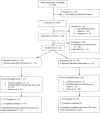Methylphenidate for attention deficit hyperactivity disorder and drug relapse in criminal offenders with substance dependence: a 24-week randomized placebo-controlled trial
- PMID: 24118269
- PMCID: PMC4226329
- DOI: 10.1111/add.12369
Methylphenidate for attention deficit hyperactivity disorder and drug relapse in criminal offenders with substance dependence: a 24-week randomized placebo-controlled trial
Abstract
Aim: To test the efficacy and safety of osmotic release oral system (OROS) methylphenidate (MPH) in doses up to 180 mg/day to treat attention deficit hyperactivity disorder (ADHD) and prevent any drug relapse in individuals with a co-diagnosis of ADHD and amphetamine dependence.
Design: Randomized placebo-controlled 24-week double-blind trial with parallel groups design.
Setting: Participants were recruited from medium security prisons in Sweden. The medication started within 2 weeks before release from prison and continued in out-patient care with twice-weekly visits, including once-weekly cognitive behavioural therapy.
Participants: Fifty-four men with a mean age of 42 years, currently incarcerated, meeting DSM-IV criteria for ADHD and amphetamine dependence.
Measurements: Change in self-reported ADHD symptoms, relapse to any drug use (amphetamine and other drugs) measured by urine toxicology, retention to treatment, craving and time to relapse.
Findings: The MPH-treated group reduced their ADHD symptoms during the trial (P = 0.011) and had a significantly higher proportion of drug-negative urines compared with the placebo group (P = 0.047), including more amphetamine-negative urines (P = 0.019) and better retention to treatment (P=0.032).
Conclusions: Methylphenidate treatment reduces attention deficit hyperactivity disorder symptoms and the risk for relapse to substance use in criminal offenders with attention deficit hyperactivity disorder and substance dependence.
Keywords: ADHD; methylphenidate; pharmacotherapy; substance use.
© 2013 The Authors. Addiction published by John Wiley & Sons Ltd on behalf of The Society for the Study of Addiction.
Figures




Comment in
-
Commentary on Konstenius et al. (2014): on medication development for stimulant addiction.Addiction. 2014 Mar;109(3):450-1. doi: 10.1111/add.12480. Addiction. 2014. PMID: 24524320 No abstract available.
References
-
- van Emmerik-van Oortmerssena K, van de Glind G, van den Brink W, Smit F, Crunelle CL, Swets M, et al. Prevalence of attention-deficit hyperactivity disorder in substance use disorder patients: a meta-analysis and meta-regression analysis. Drug Alcohol Depend. 2012;122:11–19. - PubMed
-
- Konstenius M, Larsson H, Lundholm L, Philips B, van de Glind G, Jayaram-Lindström N, et al. An epidemiological study of ADHD, substance use, and comorbid problems in incarcerated women in Sweden. J Atten Disord. 2012 doi: 10.1177/1087054712451126 [E-pub ahead of print] - DOI - PubMed
-
- Rosler M, Retz W, Retz-Junginger P, Hengesch G, Schneider M, Supprian T, et al. Prevalence of attention deficit-/hyperactivity disorder (ADHD) and comorbid disorders in young male prison inmates. Eur Arch Psychiatry Clin Neurosci. 2004;254:365–371. - PubMed
Publication types
MeSH terms
Substances
LinkOut - more resources
Full Text Sources
Other Literature Sources
Medical

